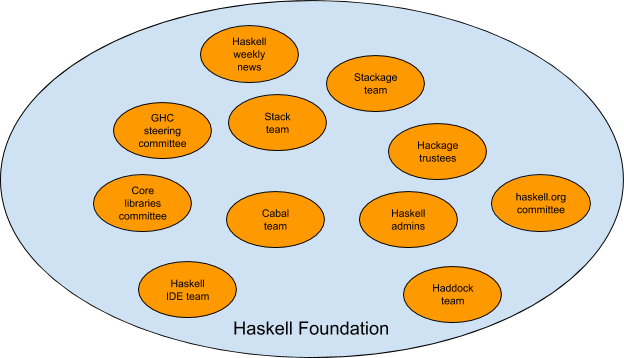
The Haskell Foundation is an independent, non-profit organization dedicated to broadening the adoption of Haskell, by supporting its ecosystem of tools, libraries, education, and research.
Driving adoption. HF seeks to foster an understanding of the benefits of using Haskell among developers who do not currently use the language, to erase barriers to entry, and to improve the Haskell ecosystem. We have many passionate and expert groups, but each is focused around a particular piece of the ecosystem, and none is dedicated to the overall user experience.
Open source. Haskell is an open source community and HF will embrace the open-source ethos wholeheartedly. HF may develop, or sponsor the development of tools and infrastructure, but it will all be open source.
Empowering the community. A major goal of HF is to augment, celebrate, and coordinate the contributions and leadership of volunteers, not to supplant or replace them.
Open, friendly, and diverse. For many of us Haskell is more a way of life than a programming language. All are welcome, all can contribute.
Transparent. All communication related to code and decision making will be publicly accessible, to enable asynchronous communication and collaboration. Only certain categories of sensitive information (e.g. financial, and matters concerning particular individuals) will be kept confidential.
True to Haskell’s principles. Haskell’s design puts principle ahead of expediency, notably by cleaving closely to the principles of purely functional programming. Success, yes, but not at all costs!

HF will have a Foundation Board (“Board” hereafter) that reflects the Haskell community and its stakeholders, including academics, commercial users, and individuals.
HF will have a staff. The size of the staff will depend on funding, but we intend to hire an Executive Director (ED), who can organize Haskell outreach, support its funding activities and oversee the rest of the staff. The staff will mostly focus on funding, marketing, and key infrastructure.
HF will work with existing and new open-source teams to channel energy into various efforts like packaging, tools, libraries, compilers, languages, documentation, user experience, and infrastructure. To reiterate, we expect that most technical contributions will be volunteer, just as it is today, but we want to position HF to fill gaps that can help adoption.
HF will establish a code of conduct and transparent decision-making that will apply to itself and any associated teams.
To the extent HF funds and pursues technical goals itself, it will pursue those goals with the same transparency as we expect from any of the teams associated with it. In this way HF will augment the community in a transparent way.
Conditions for telling this story are favorable. The days of a senior sysadmin dictating which version of Java or Python “shall be used” are dying. Containers and cloud technology have inadvertently conspired to permit engineering teams to make these decisions more often at a team level, even in larger organizations. Still, these teams need air cover and solid tools so that their decisions don’t look “rogue” to the rest of the organization.
If used correctly, Haskell can be unreasonably effective. Unfortunately, the “if” clause is not common knowledge. The HF recognizes that many of these advanced features are precisely the reason why Haskell can be successful in cases where other languages fall short. We trust that the end users will be able to make the right trade-offs that work for them. The HF will be there to help users that need to make these trade-offs by improving documentation and highlighting success stories. For example, Haskell has a great concurrency story and things like STM that are dramatically undersold in the marketplace. Some advanced features can be emphasized and taught.
The spectrum of developers is very broad: Haskell is used by both junior developers as well as long-time experts. This can cause friction, and some code may be unreadable even to other Haskell developers. This is unfortunate, because we believe that Haskell allows us to express ideas in a way that are clear and elegant. We need to delineate the common knowledge aspect of the language and tools to elevate more developers. HF should carry this banner.
Beyond that, the pesky problem of the marketplace for Haskellers remains. We often hear about fear of hiring bottlenecks and we know some engineering leaders that list this as the number one concern about Haskell. These leaders need to know one thing. You don’t have to hire a Haskell team: Haskell can make your team. Your smart Python developers can learn how to make reliable software and will love you for letting them. There is a role for HF to bridge the gap between the countless developers who want to learn and write Haskell, and the decision makers who currently believe it is hard to find these people.
